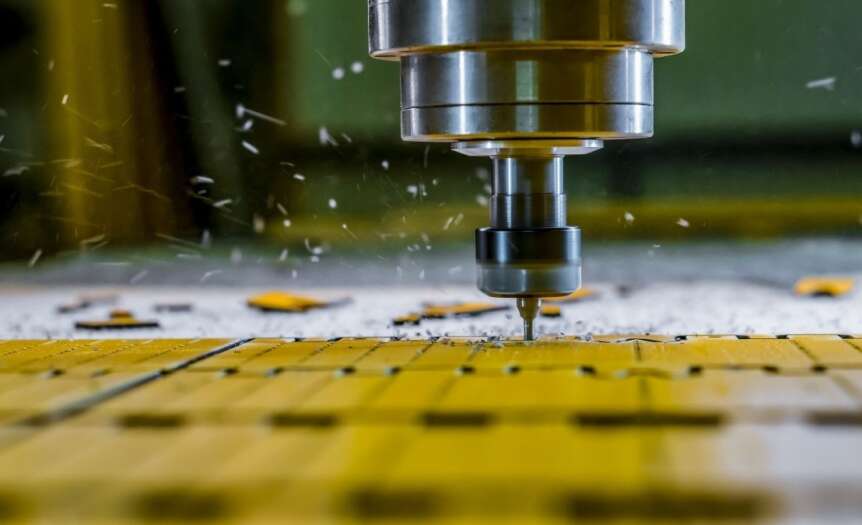The concept of the lathe is centuries old. Since the time of the ancient Egyptians, craftsmen have shaped wood into a variety of things, from table legs to goblets. And at the heart of the lathe was a tool people use to this day: the spindle.
But today’s spindles aren’t bound to a hand-operated lathe. They’re powered by far more sophisticated technology that allows them to create even more refined materials. Understanding what CNC spindles are and when to use them will allow us to better appreciate their role in modern manufacturing.
What Are Spindles?
If you’re involved in the textile field (or have ever read a fairy tale), the word spindle may conjure up images of a wooden spinning device used to spin wool into thread. But a spindle in our context refers to a pin or rod that revolves on an axis at high speeds. Manufacturers use spindles to cut, engrave, shape, and refine materials.
What Are CNC Spindles?
As we said, in the old days, spindles were attached to simpler machines. These days, we need greater power, speed, and precision. To achieve this, modern spindles are powered with computer numerical control, or CNC.
CNC machinery utilizes a closed-loop system. Operators can enter a complex system of commands into the control panel that the spindle will carry out using a powerful motor. The spindle also uses an encoder that sends feedback back to the rest of the system. That way, the tool can adjust itself for greater precision.
Applications for CNC Spindles
Once you have an understanding of what CNC spindles are and what they can do, it’s easy to see how one might utilize them for a variety of applications. Any industry that needs a powerful shaping tool can use this device. For instance:
- Manufacturing
- Automotive
- Aerospace
- Medicine
- Communications
Of course, one wouldn’t use the same spindle to create parts for a car engine that they would for cell phone parts. Different spindles have different types of motors depending on their purpose. Manufacturers must be intentional about which spindle motor they choose for their operations.
The spindle may be old technology, but it’s far from outdated. CNC machinery is proof that we can continue to adapt technology to meet the needs of a modern world.










 Deering Estate
Deering Estate
 Massage Envy South Miami
Massage Envy South Miami
 Calla Blow Dry
Calla Blow Dry
 My Derma Clinic
My Derma Clinic
 Sushi Maki
Sushi Maki
 Sports Grill
Sports Grill
 The Healthy Kitchen
The Healthy Kitchen
 Golden Rule Seafood
Golden Rule Seafood
 Malanga Cuban Café
Malanga Cuban Café

 Kathleen Ballard
Kathleen Ballard
 Panter, Panter & Sampedro
Panter, Panter & Sampedro
 Vintage Liquors
Vintage Liquors
 The Dog from Ipanema
The Dog from Ipanema
 Rubinstein Family Chiropractic
Rubinstein Family Chiropractic
 Your Pet’s Best
Your Pet’s Best
 Indigo Republic
Indigo Republic




 ATR Luxury Homes
ATR Luxury Homes


 2112 Design Studio
2112 Design Studio
 Hamilton Fox & Company
Hamilton Fox & Company
 Creative Design Services
Creative Design Services
 Best Pest Professionals
Best Pest Professionals
 HD Tree Services
HD Tree Services
 Trinity Air Conditioning Company
Trinity Air Conditioning Company
 Cisca Construction & Development
Cisca Construction & Development
 Mosquito Joe
Mosquito Joe
 Cutler Bay Solar Solutions
Cutler Bay Solar Solutions


 Miami Royal Ballet & Dance
Miami Royal Ballet & Dance
 Christopher Columbus
Christopher Columbus
 Pineview Preschools
Pineview Preschools
 Westminster
Westminster
 Carrollton
Carrollton
 Lil’ Jungle
Lil’ Jungle
 Frost Science Museum
Frost Science Museum
 Palmer Trinity School
Palmer Trinity School
 South Florida Music
South Florida Music
 Pinecrest Orthodontics
Pinecrest Orthodontics
 Dr. Bob Pediatric Dentist
Dr. Bob Pediatric Dentist
 d.pediatrics
d.pediatrics
 South Miami Women’s Health
South Miami Women’s Health

 The Spot Barbershop
The Spot Barbershop
 My Derma Clinic
My Derma Clinic




 Miami Dance Project
Miami Dance Project

 Rubinstein Family Chiropractic
Rubinstein Family Chiropractic
 Indigo Republic
Indigo Republic

 Safes Universe
Safes Universe
 Vintage Liquors
Vintage Liquors
 Evenings Delight
Evenings Delight





 Atchana’s Homegrown Thai
Atchana’s Homegrown Thai
 Baptist Health South Florida
Baptist Health South Florida

 Laser Eye Center of Miami
Laser Eye Center of Miami
 Visiting Angels
Visiting Angels
 OpusCare of South Florida
OpusCare of South Florida

 Your Pet’s Best
Your Pet’s Best





 HD Tree Services
HD Tree Services
 Hamilton Fox & Company
Hamilton Fox & Company


 Creative Design Services
Creative Design Services